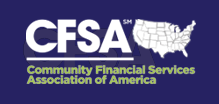Beware of Scammers and Fraudsters during COVID-19
March 25, 2020 | Press Releases
The Community Financial Services Association of America (CFSA) and its member companies are committed to continuing to meet your needs safely and responsibly while we all adjust to the ongoing coronavirus (COVID-19) pandemic. However, some bad actors are using this public health situation as an opportunity to steal your money, personal information, or both. State and federal agencies have begun sounding the alarm on scammers attempting to leverage this global pandemic to take advantage of consumers, particularly online.
CFSA strongly condemns these unscrupulous practices, and in fact, our members have a track record of working with lawmakers across the country to prevent these bad actors from taking advantage of you. These scammers looking to defraud consumers do not in any way represent the legal, licensed lenders around the country who provide vital credit and non-credit products to millions of Americans.
The Federal Trade Commission has released a list of tips on how to identify and avoid bad actors during this crisis, including:
- Do not respond to messages, emails or calls that claim to be delivering a check from the government. While Congress is currently working on a proposal to provide relief to American families, no such program is in place yet.
- Do not click any links from people you do not know. This includes links in unsolicited text messages or emails, which may be masked as delivery or bank account notifications in an attempt to gain your personal information.
- Do not trust robocalls, anonymous text messages or emails that claim to have information about COVID-19. Instead, rely on information from credible sources, such as the Centers for Disease Control and Prevention and the World Health Organization.
- Know how to spot scams and fraud. The Consumer Financial Protection Bureau website has a portal with plenty of helpful information to identify these scammers and fraudsters and help keep yourself and your personal information safe.
For additional information, visit the CFPB’s coronavirus hub and the FTC’s website about coronavirus scams. We also recommend that you sign up for FTC Consumer Alerts to get the latest information about new scams as they arise.

